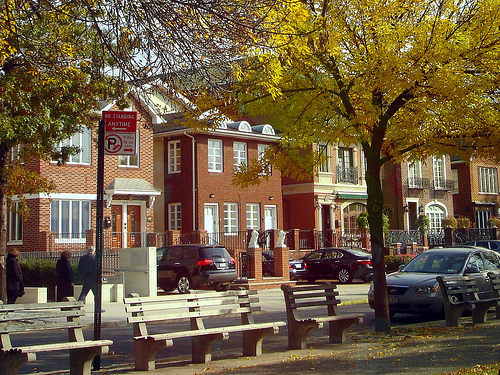Fall Home Maintenance Checklist
 With the days of watering, weeding and mowing behind you, getting ready for the colder months ahead is like packing for a long, well-deserved vacation. (At least that's how some of us feel.) Here's a list of what you need for your offseason “getaway.” Now, hurry up and get 'er done so you can relax already!
With the days of watering, weeding and mowing behind you, getting ready for the colder months ahead is like packing for a long, well-deserved vacation. (At least that's how some of us feel.) Here's a list of what you need for your offseason “getaway.” Now, hurry up and get 'er done so you can relax already!
Home Exterior
Roof: Give the shingles and flashing (metal or rubber pieces at transitions) a once-over to check for damage or potential leaks. Seal visible cracks and gaps with roofing cement.
Gutters: Clean gutters after the leaves fall, and you’ll be good for the winter. Flush out downspouts with a garden hose on full-blast.
Siding and brickwork: Inspect siding and trim for damage, cracks and open joints. Caulk gaps or replace damaged materials as needed. Winter is particularly hard on brick and other mortared masonry; now’s the time to have any necessary tuckpointing done to prevent further damage from water freezing inside of cracks in mortar.
Concrete and asphalt: As with mortar, water freezes in cracks in concrete and asphalt walks, patios and driveways, advancing deterioration. Seal cracks with an appropriate flexible sealant.
Thermal Envelope
Windows: Prepare storm windows by cleaning, removing screens, recaulking, etc. as needed. Check for air leakage around main window sashes, and replace weatherstripping as needed. Replace exterior caulk if necessary (don’t caulk under the sill if none is there already).
Doors: Inspect weatherstripping, including the threshold strip, and replace as needed.
Roof ventilation: Inspect eave/soffit intake vents and rooftop exhaust vents to make sure insulation, nests, etc. aren’t blocking airflow. If you’ve had ice dam problems in the past, poor ventilation is a likely cause.
Attic insulation: While you’re in the attic checking the ventilation, look for areas where warm air might be rising up into the attic (the other major cause of ice dams). Make sure all ceiling penetrations are air-sealed and adequately insulated (some recessed lights can be covered with insulation; some cannot).
HVAC
Filters: Replace the filter on the furnace and all ventilation equipment. Use a good furnace filter and make sure it’s facing the right way (indicated by the “airflow” arrow).
HVAC check: Consider a routine professional inspection of your furnace, boiler or heat pump to make sure all is well. Also check the humidifier for cleanliness and proper function.
Air registers: Make sure all forced-air supply and return grills in the living spaces are clean and not blocked by furniture and the like.
Vent fans: Do an outdoor inspection of vent hoods and termination caps, checking flapper doors for smooth operation. Turn on the fan to make sure outflow of air is normal (no blockage in ducting). While you’re at it, run the same test on the clothes dryer.
AC: Clean and cover outdoor central AC unit. Remove and store window units.
Fireplace: Have wood-burning fireplace chimneys professionally cleaned and inspected (typically every year or two) or inspect them yourself to look for nests and other blockage in the flue. Make sure the damper closes properly (and close it now so you don’t forget).
Smoke/CO detectors: Replace batteries in smoke alarms and carbon monoxide detectors. CO hazards are worst in winter, when houses are shut up and furnaces and fireplaces are going.
Yard & Garden
Call an expert: If you have any questions about caring for your lawn, ornamental plants or garden, call or email a local extension service. Your city probably has one; if not, one of your state’s universities will.
Lawn: Fertilize turf with the best organic product for the dormant season, and don’t forget to water it in. Rake up leaves when they get thick. It’s OK to let random scattered leaves decompose on the grass, but a heavy mat of leaves suffocates it.
Outdoor spigots: Remove hoses from spigots (outdoor faucets). Drain spigots, as applicable.
Pruning: Most trees and shrubs should be pruned in late fall and/or early spring.
Plant: Many hardy varieties of ornamental plants do well when planted in fall. Do this while the ground is still warm and there’s time for adequate watering. Be sure to water new and young plants during winter dry spells, too.
Lawnmower: Prepare the lawnmower and other small-engine equipment for winter storage, following the owner’s manual. This prevents the number one cause of small-engine repair: old gas left in the tank.
Mice: Nip the annual rodent problem in the bud by setting out mousetraps as soon as the nights turn cold. The type of trap or relocation hotel is up to you
Looking for a Pro? Call us (866) 441-6648

Roofing Average Costs
Roofers Experiences

Blown Away By A Lovely, Affordable Handyman -- In New York City!

Bathroom Ceiling Painting And Repair Required By Mortgage Lender



